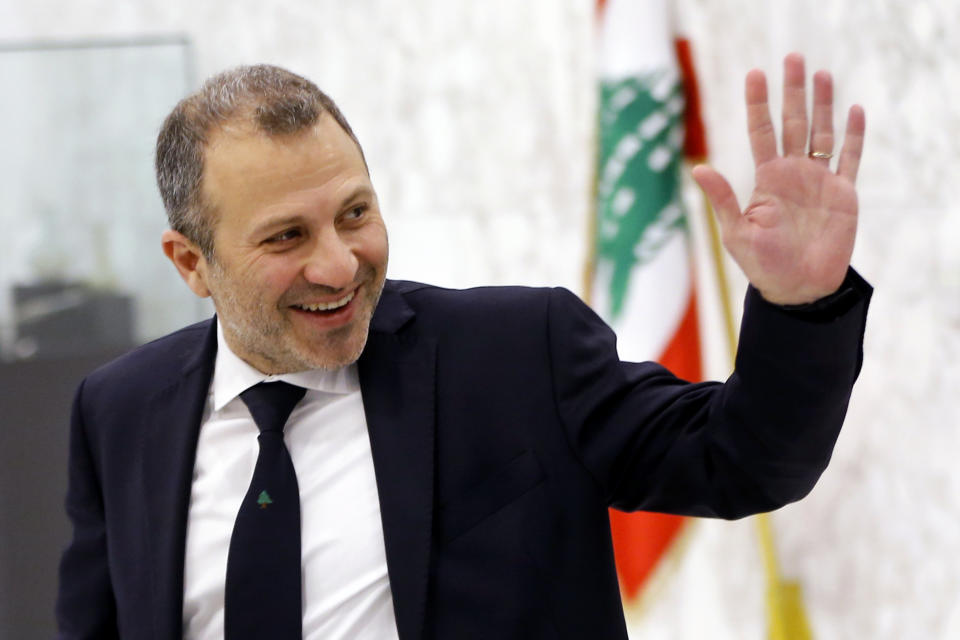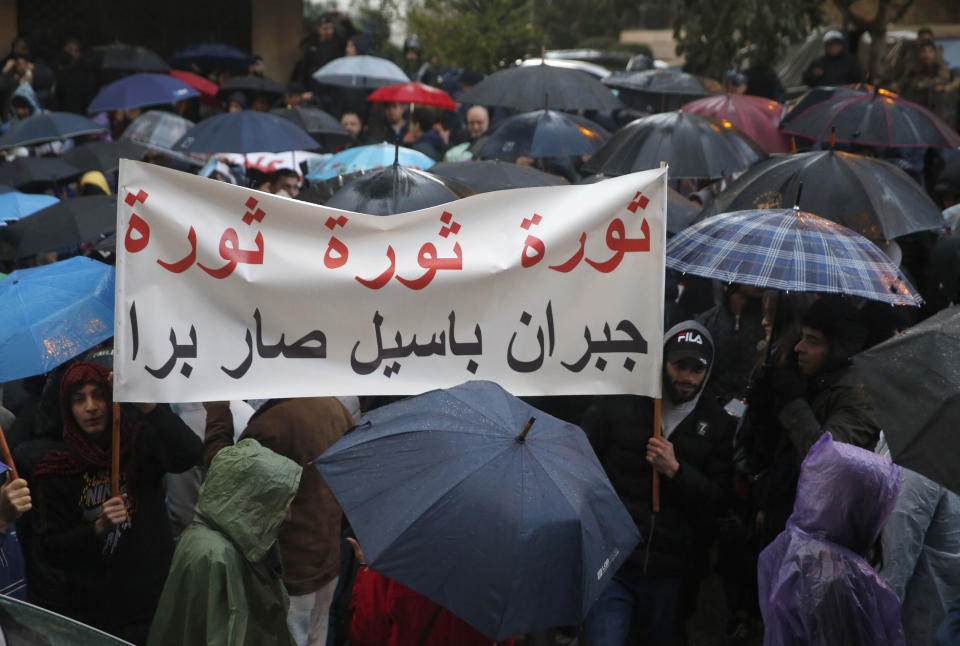Many Lebanese say acting FM has no business being at Davos
BEIRUT (AP) — Lebanon’s acting foreign minister is attending the elite annual World Economic Forum in the Swiss village Davos. In his home country, however, where mass protests have forced the government to resign, a campaign is afoot to have him uninvited.
Many Lebanese took to social media to tell the forum they think Gebran Bassil has no business being there. More than 18,000 participated in a Twitter poll, in which over 75% said he doesn't represent them. Online petitions against his participation collected nearly 50,000 signatures.
“The Lebanese people cannot and will not accept a failed, corrupt and especially an ousted minister to still represent their voice on the world stage,” one petition read.
Another said Bassil bragged last year at Davos that he can teach others how to run a country without a budget while Lebanon grappled with its worst economic crisis. The petition writers appealed to the forum to “rethink Mr. Bassil’s invite and listen to the people of Lebanon.”
The pressure comes as public anger in Lebanon against the entire political class is mounting. Nationwide, protests erupted in October accusing Lebanon's long-serving ruling elite of squandering the country's resources. They also have chased politicians out of restaurants with chants. In recent days, protests have become more violent as frustration grows over failure to form a new government three months after the previous one resigned.
As the head of the largest Christian party, Bassil is one of Lebanon's most prolific political figures, holding various ministerial positions for more than a decade. Many attribute a rise in anti-refugee sentiments to rhetoric and policies supported by Bassil. As the son-in-law of the country's president, he was believed to harbor presidential aspirations, acquiring opponents along the way. When protests broke out, Bassil bore the brunt of the criticism.
The World Economic Forum said Bassil is still acting foreign minister and a member of Parliament, adding they are closely following developments in Lebanon.
“He will take part in a public dialogue on the situation in the country and the region,” said Oliver Cann, head of Strategic Communications at the World Economic Forum.
Bassil is scheduled to speak on a panel Thursday titled the “Return of the Arab Unrest” alongside Rached Ghannounchi, a Tunisian politician. In that country, the transition to democracy has been hailed as a success after an earlier wave of protests in the region.
Hadley Gamble, the CNBC journalist who will moderate the discussion, said many Lebanese have reached her on social media to express their objection to Bassil's participation. She told CNBC she plans to hold him “very much to account for what is happening" in Lebanon.
Bassil’s aide, May Kreich, dismissed the criticism as part of a campaign to undermine Bassil, saying it is up to him whether he participates.
Kreich said Gamble's comments were part of a “Zionist” foreign plot against Bassil and that “everyone inside Lebanon who takes part in this campaign against Bassil’s participation is directly or indirectly participating in this Zionist campaign.” She spoke to Lebanon's Al-Jadeed TV using a common accusation by Lebanese officials to discredit opponents.
Sabine Choucair is a performer who works as a clown and was invited to represent Lebanon at Davos in 2017. She was chosen as a cultural leader alongside Matt Damon and others for her humanitarian work with refugees. She said she is “furious and sad” her country is represented by an official who stands for everything its people are protesting against.
“Why would us people on the streets want to be represented by a racist, corrupt and resigned politician who not only hasn't accomplished anything but who was also part of driving the country and its people into the ground,” Choucair said.
Others questioned how the cash-strapped government can afford such an expensive forum. “The country is bankrupt,” said Rula El Halabi, who started the Twitter poll.
Ramez Dagher, who writes in the political blog Moulahazat, said Bassil discussing popular rallies amounts to a “conflict of interest."
“For Lebanese politicians, representing the Lebanese in events like Davos gives them a sense of legitimacy that they are lacking locally,” Dagher said.



